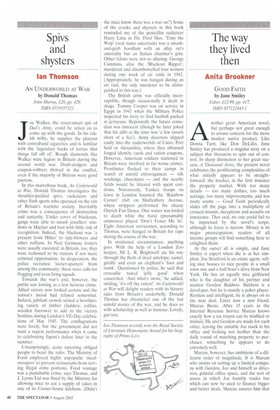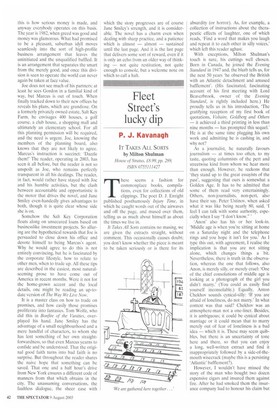The way they lived then
Anita Brookner
GOOD FAITH by Jane Smiley Faber, £12.99, pp. 417, ISBN 0577278437 Another great American novel, but perhaps not great enough to arouse concern for the more modest native product. Like Donna Tartt. like Don DeLillo, Jane Smiley has produced a singular story on a subject that threatens to spin out of control. In sharp distinction to her great success, A Thousand Acres, the present novel celebrates the proliferating complexities of what initially appears to be straightforward: the market, in the first instance the property market. With too many details — too many dollars, too much acreage, too many improvements, and too many scams — Good Faith periodically slides off the page into a multiplicity of crossed strands, deceptions and assaults on innocence. That said, no one could fail to be impressed by the novel's scope, although its focus is narrow. Money is its major preoccupation; readers of all income groups will find something here to enlighten them.
At the outset all is simple, and Jane Smiley is expert when she is at her simplest. Joe Stratford is an estate agent, selling nice houses to nice people in a small town one and a half hour's drive from New York. He has an equally nice girlfriend who is the daughter of his partner and mentor Gordon Baldwin. Baldwin is a developer, but he is mainly a poker player. Restless and intelligent, he is always on to the next deal. Enter now a new friend, Marcus Burns. After 15 years in the Internal Revenue Service Marcus knows exactly how a tax return can be misfiled or mislaid. He and Gordon are made for each other, leaving the amiable Joe stuck in his office and looking not further than the daily round of matching property to purchaser, something he appears to do extremely well.
Marcus, however, has ambitions of a different order of magnitude. It is Marcus who insists on setting up a limited company with Gordon, Joe and himself as directors, palatial office space, and the sort of assets in which Joe humbly trades but which can now be used to finance bigger and better deals. Marcus assures him that this is how serious money is made, and anyway everybody operates on this basis. The year is 1982, when greed was good and money was glamorous. What had promised to be a pleasant, suburban idyll moves seamlessly into the sort of high-profile business arrangement that leaves the uninitiated and the unqualified baffled. It is an arrangement that separates the smart from the merely good, and once this division is seen to operate the world can never again be taken at face value.
Joe does not see much of his partners; at least he sees Gordon in a familial kind of way, but Marcus is out of touch. When finally tracked down to their new offices he reveals his plans, which are grandiose. On a formerly privately owned estate, Salt Key Farm, he envisages 400 houses, a golf course, a club house, a shopping mall and ultimately an elementary school. For all this planning permission will be required, and the need is urgent. Joe, knowing the members of the planning board, also knows that they are not likely to agree. Marcus's instruction is succinct: 'Dazzle them!' The reader, operating in 2003. has seen it all before, but the reader is not so unspoilt as Joe, who remains perfectly transparent in all his dealings. The reader, in fact, would rather have stayed with Joe and his humble activities, but the clash between accountable and opportunistic is the motor that drives the novel, and Jane Smiley even-handedly gives advantages to both, though it is quite clear whose side she is on.
Somehow the Salt Key Corporation floats along on unsecured loans based on businesslike investment projects. So alluring are the hypothetical rewards that Joe is persuaded to close down his office and devote himself to being Marcus's agent. Why he would agree to do this is not entirely convincing, but he is fascinated by the corporate lifestyle, how to relate to other men, when to trade up. All these tips are described in the easiest, most naturalseeming prose to have come out of America in recent months. Were it not for the home-grown accent and the local details, one might be reading an up-todate version of The Way We Live Now.
It is a master class on how to trade on promises, and how easily those promises proliferate into fantasies. Tom Wolfe, who did this in Bonfire of the Vanities, overplayed his hand. Jane Smiley has the advantage of a small neighbourhood and a mere handful of characters, to whom she has lent something of her own straightforwardness, so that even Marcus yearns to confide and be understood. That the original good faith turns into bad faith is no surprise. But throughout the reader shares the naive hope that something can be saved. That one and a half hour's drive from New York ensures a different code of manners from that which obtains in the city. The unassuming conversations, the faultless dialogue, the sheer ease with
which the story progresses are of course Jane Smiley's strength, and it is considerable. The novel has a charm even when dealing with sharp practice, and a patience which is almost — almost — sustained until the last page. And it is the last page that delivers some sort of reward, even if it is only an echo from an older way of thinking — not quite restitution, not quite enough to console, but a welcome note on which to call a halt.



































































 Previous page
Previous page